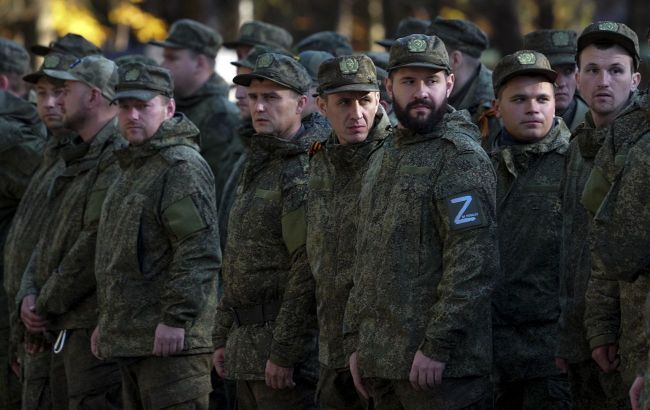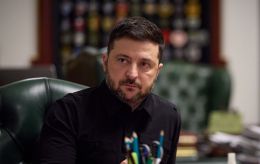Putin may shift war strategy as offensive stalls – ISW
 Photo: The Russians can no longer advance quickly and effectively in Ukraine (Getty Images)
Photo: The Russians can no longer advance quickly and effectively in Ukraine (Getty Images)
The Russian army is seizing less and less Ukrainian territory while suffering significant losses in personnel and resources. Putin may reconsider his approach to further offensive operations, according to the report from the Institute for the Study of War (ISW).
According to the institute, Russian gains on the front lines have slowed over the past four months, yet the invading forces continue to suffer personnel losses comparable to those recorded during the intense offensives between September and December 2024.
Losses and slowing offensive
ISW estimates that in January, February, March, and April 2025, Russian forces captured a total of 1,627 square kilometers of territory in Ukraine and the Kursk region. According to daily reports from the General Staff of the Armed Forces of Ukraine, Russian losses over the past four months amounted to 160,600 soldiers — an average of 99 casualties per square kilometer.
According to analysts, Russian forces captured approximately 496 km² in January 2025; around 313 km² in February; about 601 km² in March; and roughly 217 km² in April.
ISW also reported a slowdown in Russia’s offensive, noting that over the past four months, Russian troops have encountered better-defended Ukrainian positions in and around major cities such as Kupiansk, Chasiv Yar, Toretsk, and Pokrovsk. At present, Russian forces are suffering higher losses per square kilometer than they did in the fall of 2024.
ISW stated that from January to April 2025, Russia’s territorial gains were 45% slower compared to the period from September to December 2024, while personnel losses decreased by only 10%.
"ISW has not observed a notable decrease in the tempo of Russian offensive operations along the frontline in recent months, despite the slowing rates of advance, suggesting that Russia is generating enough forces to sustain these casualties without having to deprioritize any frontline area," the report said.
Putin's pressure in negotiations
Meanwhile, Russian dictator Vladimir Putin is attempting to maintain the momentum of offensive operations to exert pressure on Ukraine in ceasefire talks. According to ISW, the Kremlin aims to prolong negotiations in order to extract further concessions from the US and Ukraine, while securing additional gains on the battlefield.
However, it remains unclear whether Russia will be able to maintain the necessary level of manpower to continue offensive operations in Ukraine indefinitely, given the rising economic costs of social payments and one-time bonuses to Russian service members.
The institute noted that Russia’s current and projected economic challenges are closely tied to its battlefield losses, and that the United States and the West cannot apply maximum pressure on Russia through economic tools alone.
"The United States can better leverage Russian vulnerabilities and achieve a stronger negotiating position and more durable resolution to the war in Ukraine by forcing Putin to rethink his negotiation and battlefield strategies and empowering Ukrainian forces to continue inflicting significant manpower and materiel losses on Russia," ISW concluded.
Shift in short-term objectives
Western intelligence suggests that Putin may begin prioritizing short-term goals, such as consolidating Russian gains in Ukraine and maintaining domestic economic stability, over the capture of new territory.
However, experts point out that Putin’s demonstrated commitment to maintaining the pace of Russia’s offensive operations — despite sustained high casualty rates — does not support that assessment.
ISW analysts believe that a future slowdown in Russian offensive activity or a transition to defensive operations — either across the entire theater or in specific areas — would indicate a shift in Putin’s short-term goals from territorial expansion to consolidation of held territory.
They do not rule out that Putin may refocus on shorter-term objectives due to mounting economic and personnel constraints that increasingly hinder Russia’s ability to wage war in Ukraine.
Additionally, Russian forces may slow the pace of offensive operations and adopt policies and tactics aimed at reducing losses, if Putin orders a shift toward prioritizing the consolidation of Russian control over occupied Ukrainian territory instead of pursuing further territorial gains.
"Russian forces would likely shift to defensive operations with the aim of fortifying and consolidating current positions on the frontline, largely in an effort to safeguard battlefield gains and preserve increasingly limited manpower and materiel reserves, in response to such an order. Russian forces could begin constructing fortifications near frontline positions in response to such an order," the report said.
Frontline situation and pressure on the Kremlin
The operational situation on the front line between Ukraine and Russia remains difficult. Russian forces are actively implementing new assault tactics in the Donetsk region.
The aggressor continues to carry out nightly strikes on rear settlements using Shahed attack drones.
Last night, Russian forces again launched a large-scale drone strike on Kharkiv. The resulting explosions sparked multiple fires in the city, injuring about 50 people.
Meanwhile, US Secretary of State Marco Rubio stated that peace is now closer, but the end of the war is still far off.
The White House is developing new measures to increase pressure on the Kremlin, as Putin has shown no willingness to end the war.

